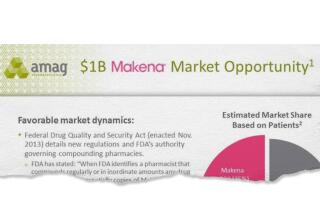Orphaning More Than a Drug
- Share via
Orphan drugs are medications that have not yet been approved by the federal Food and Drug Administration and are of benefit to relatively few people. This designation qualifies the manufacturer to receive certain benefits from the government in exchange for developing the drug. The drug company can pull this drug off the market at any time even if it has been used by patients effectively for 20 years and will wreak havoc with lives. Such is the case of my daughter, for whom Nitrazepam is a lifeline to normal life.
My daughter, Amy, used to have 40 to 50 seizures a day, crashing to the ground each time like a marionette with cruelly cut strings. But today this beautiful brunette teenager is calm and in control of herself. She likes to ride a tandem bike with her dad. She roller-skates, bowls and goes to summer camp with normal children. Last month, she danced at her sister’s wedding.
Thirteen years ago, Amy took her first dose of Nitrazepam. Within 36 hours, her seizures stopped and she has had none since. I made the mistake of breathing a big sigh of relief, assuming we had found a way for her to enjoy a decent quality of life. And it was so simple: three tiny pills each day.
You can imagine then the desolation I felt recently when I received a registered letter in the mail that made it clear that the quality of Amy’s life will soon be drastically diminished. She will have to wear a helmet all day, will be able to leave the house only rarely and will fall down a lot, bruising herself and breaking bones. She is going to be having multiple seizures again.
The manufacturer has decided to no longer make available the medication that she and about 500 other children and young adults must take every day in order to function with some degree of normalcy. Hoffmann-La Roche, one of the largest pharmaceutical companies in the world, will stop importing Nitrazepam (registered name, Mogadon) into the United States. This is for fiscal, not medical, reasons.
The anti-convulsant is currently dispensed on a “compassionate basis” at 54 medical centers across the United States. It has proved very effective for children like Amy, diagnosed with the bleakest forms of epilepsy, often leading to severe retardation and taking a great toll on the body.
According to Amy’s neurologist at UCLA and one at Children’s Mercy Hospital in Kansas City, Mo., efforts to transition children on Nitrazepam to other drugs have had only limited success. The Epilepsy Foundation of America tells me that it has lobbied to no avail to get the company to reverse the decision.
Nitrazepam will still be manufactured in Switzerland. But even if my husband and I made expensive international drug runs to keep our daughter supplied with her prescription, who would monitor her?
When Amy was 2 or 3 years old and tumbling to the floor every few hours, I could convince myself that it was almost typical toddler behavior. She weighed only 30 or 40 pounds and I kept her isolated in a playpen or crib to protect her.
But now she is 18 years old and weighs 145 pounds. She has grown accustomed to living with a fair amount of independence. What cruelty to force her suddenly to return to a life of seizures, with constant bruises, frequent broken bones, no more days spent at a public school alongside normal children, no longer a moment out of her mother’s sight.
A huge drug company says that for fiscal reasons--a tiny blip on its huge spreadsheet--it will discontinue this drug and “orphan” the helpless patients dependent on it. If a drug has been successfully and safely taken by a large sampling of patients, no drug company should be allowed to capriciously withdraw that drug, making it unavailable for those who depend on it to lead a normal life.






